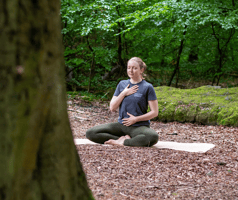What is anxiety? Anxiety is what we feel when we are worried, tense or afraid – particularly about...
World Gratitude Day: 4 Benefits of Gratitude
21st September is World Gratitude Day! So today we’re celebrating all of the wonderful benefits of practising gratitude.
What is a gratitude practice?
When was the last time you stopped to think about what you’re grateful for? All this involves is thinking about the positive things in your life and how thankful you are for them. It sounds incredibly simple, but the benefits of doing this (in some form or another) can be big. Practising gratitude could be writing down 3 things you’re grateful for each day, or simply pausing during the day to take in your surroundings and being grateful for the present moment.
What are the benefits of gratitude?
1. It helps to boost our mood

This is the area a lot of researchers focus on and the one with perhaps the most concrete results. A leading researcher in this area, Robert Emmons has found through his work and multiple studies that gratitude can increase happiness and reduce feelings of depression. Gratitude has also been found to reduce other negative emotions, including envy, resentment and even regret.
This makes sense as when we’re feeling grateful, it’s difficult to feel anything negative. By practising gratitude regularly as well, we get into a habit of being thankful for what we’ve got, even if it’s not exactly what we wanted. Take a look at our articles on Positive Psychology in the Wellness Library to explore this more!
2. It can reduce stress

Gratitude has been found to help us regulate our emotions better, and this is an integral part of managing stress. Looking at participants’ heart rates before, during and after practising gratitude, a 2017 study by Kyeong et al published in Scientific Reports found that heart rates decreased. Our heart rate decreasing is linked to us feeling calmer, so it’s easy to see the link here.
So, the next time you’re feeling overwhelmed and stressed, make it a priority to close your eyes and run through a list of things you feel grateful for in this moment. It may feel difficult, but it will likely help to calm you down and put things into perspective.
3. It can improve our sleep

Ending your day on a positive note could help you sleep better and for longer. A 2011 study published in Applied Psychology: Health and Well-Being found that all it takes is 15 minutes of writing about what you’re grateful for to have a positive impact on your sleep.
If you don’t already have a journaling practice and you struggle to sleep, it’s definitely worth a try. You may find it helpful to note down any remaining thoughts or worries from your day and then spend some time writing about what you’re grateful for. This can help clear your mind and leave you feeling positive as you head to bed.
4. It can improve our social wellbeing and relationships

Practising gratitude has an effect on our social wellbeing by improving our friendships and relationships too. A 2011 study by Lambert and Fincham discovered that those who communicate their gratitude with friends are more likely to talk through any concerns or problems they come up against and have a more positive perception of their friends.
This is perhaps due to the fact that gratitude reduces aggression and enhances empathy, a result found via a series of five 2012 studies published in Social Psychology and Personality Science.
What will you do to practise gratitude today? Here are some simple ways you could begin your gratitude practice (if you're not yet a member of My Self-Care Sanctuary, you can access any of these sessions within the 7 day free trial):



